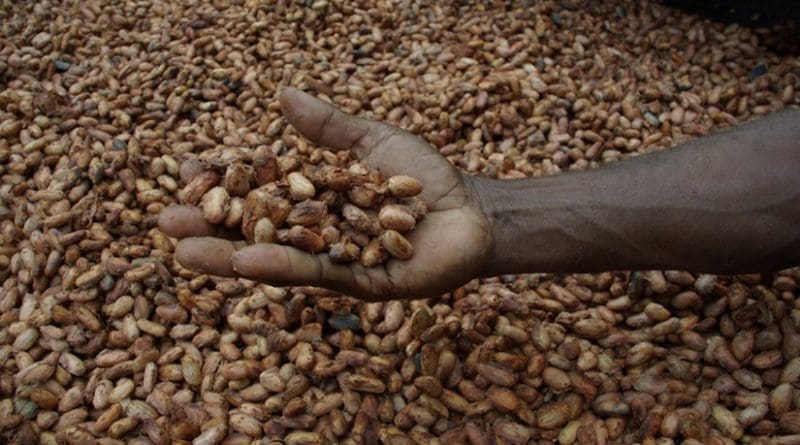Commodity Exporting Countries Losing Billions Of Dollars – Analysis
By IDN
By Jaya Ramachandran
A new United Nations report lists China, Germany, India, Italy, Japan, the Netherlands, Spain, Switzerland, Britain and the U.S. among countries that are benefiting from ‘trade misinvoicing’ practised by a large number of Commodity Dependent Developing Countries (CDDCs).
Trade misinvoicing – involving resort to deliberately misreporting the value of a commercial transaction on an invoice submitted to customs – “continues to be used as a key mechanism of capital flight and illicit financial flows from developing countries”, says a study by the Geneva-based UNCTAD, the United Nations Conference on Trade and Development.
Nearly 90 of developing countries are losing commodity export earnings worth billions of dollars in valuable foreign exchange earnings, taxes and income that might otherwise be spent on development. $3.9 trillion is the estimated annual investment required for achieving Sustainable Development Goals by the year 2030 ,
According to UNCTAD, in 2012-13, two out of three of all developing countries were Commodity Dependent Developing Countries (CDDCs) with half of these in Africa. It also indicates that commodity dependence increased between 2009-10 and 2012-13, with half of developing countries having seen their dependence on commodities grow during this period.
Dependency on commodities is even more severe in the most vulnerable countries, such as the Least Developed Countries (LDCs) group. In 2012-13, 85 per cent of LDCs could be considered as CDDCs. Their situation deteriorated compared to 2009-10.
UNCTAD data reveal that while developing countries rely heavily on commodities, their commodity exports are highly concentrated and export revenues dependent on a handful of primary products. For instance, the top three commodities exported from any given country contributed for more than 60 per cent of merchandise exports in 90 per cent of the 45 CDDCs in Africa in 2012-13.
Released during the UNCTAD Global Commodities Forum, an integral part of UNCTAD14 from July 17-22 in Nairobi, Kenya, the study avails of two decades’ worth of data covering exports of commodities such as cocoa, copper, gold and oil from Chile, Côte d’Ivoire, Nigeria, South Africa and Zambia.
“This research provides new detail on the magnitude of this issue, made even worse by the fact that some developing countries depend on just a handful of commodities for their health and education budgets,” UNCTAD Secretary-General Mukhisa Kituyi said.
Commodity exports may account for up to 90 per cent of a developing country’s total export earnings, he said, adding that the study generated fresh lines of enquiry to understand the problem of illicit trade flows.
“Importing countries and companies that want to protect their reputations should get ahead of the transparency game and partner with us to further research these issues,” Kituyi said.
The UNCTAD study highlights that between 2000 and 2014, under-invoicing of gold exports from South Africa amounted to $78.2 billion, or 67 per cent of total gold exports. Trade with the leading partners exhibited the highest amounts, as follows: India ($40 billion); Germany ($18.4 billion); Italy ($15.5 billion); Britain ($13.7 billion).
Between 1996 and 2014, under-invoicing of oil exports from Nigeria to the U.S. was worth $69.8 billion, or 24.9 per cent of all oil exports to the United States. Zambia recorded between 1995 and 2014, $28.9 billion in copper exports to Switzerland, more than half of all its copper exports, yet these exports did not appear in Switzerland’s books.
Chile recorded in the years 1990-2014 $16.0 billion in copper exports to the Netherlands, but these exports did not appear in the Netherlands’ books. Also 31.3 per cent ($5.0) of Côte d’Ivoire’s cocoa exports worth $17.2 billion between 1995 and 2014 did not appear in the Netherlands’ books. Between 2000 and 2014, under invoicing of iron ore exports from South Africa to China was worth $3 billion.
The UNCTAD study aims to contribute to research and policy debates by providing empirical evidence on the magnitude of trade misinvoicing in the particular case of primary commodity exports from five natural-resource-rich developing countries: Chile, Côte d’Ivoire, Nigeria, South Africa and Zambia.
This sample comprises four resource-dependent developing countries and a more diversified resource-rich middle-income country (South Africa). It covers a representative sample of products in the three main categories of primary commodities: oil and gas; minerals, ores and metals (copper, gold, iron ore, silver and platinum); and agricultural commodities (cocoa).
According to the authors of the study, the inclusion of two copper exporters in the sample makes it possible to compare and contrast patterns of copper misinvoicing between two countries and over time.

